Music About Gaza, Mahmoud Darwish, and Flannery O’Connor’s Birthday
A new Ocean Vuong poem in the Believer and the first part of a short story I wrote.
In this week’s newsletter: Anouar Brahem composed an album for Gaza, Flannery O’Connor’s birthday, a new Ocean Vuong poem in the Believer, and the first part of a short story I wrote.
The Amazon I: A Short Story (in three parts)
by Renata Mosci Sanfourche
It is a curse disguised as a blessing when a woman finds her life commanded by faith instead of complete self-possession. She converted three months before she found out she was pregnant with me, I was born a few days before summer on the eastern end of the Amazon.
She hoped I’d arrive after her trip to the Carajás Mountains, but during church service that evening she felt a tightening sensation spread across her stomach. My brother’s delivery was in a maternity ward between the lake and the beach in the south zone of Rio, it was long and sterile, and she found pleasure when she held him in her arms. My birth was harsh and her pregnancy pathetic, the many interventions she suffered while carrying me had marred any glory in birthing a child. Each time the doctor reached inside to detach her uterus from her cervix, she regretted me more. Having children was a torment.
Later in life she’d often maintain this certain contempt toward me. When I touched on her serenity, she’d dream out loud of a life happier had she chosen to spend it with another man; she could have built her life along the main avenue of the botanical gardens having done without pregnancy, without me, without you.
In this old photograph you gave me I can see outside the room. Cicadas sing in the canopies and the croaking of the frogs grows steadily. Macaws announce the coming of the night in their rah-rah-rah flight over the blackwater rivers. The midwife pulled me from underneath the soiled sheets. She brought me closer to the cries of the night until your calloused hand reached for me. In your other hand you held the wax vestiges of a candle still waning, pain flickered briefly in our eyes.
They say I was precocious, I opened my eyes the moment I arrived. I saw your broad fingers, your ridged and discolored nails and I cried. You say my cry swaddled the sounds of the frogs, that my ongoing shrieks pierced the clicking ribs of the cicadas, but only in the light did tears drip down my cheeks. The midwife placed a steaming cup of water next to her. She wrapped me in her arms and we drifted into our first night. She coddled me so tight that when I woke up my cheeks were flushed and sticking to her breast.
Now I see you outside in fresh air, you can’t find harmony in nature. No matter how many times the sun rises, no matter how bright its rays seep through the stained glass; purple rays, red rays, green rays of light spreading across the nave, unfurling the splinters, you still can’t see. Light could melt on you, like it did the morning after I was born, and you still wouldn’t see. You watched the parrots make their early calls, you saw them fly to the top of the palms, dip their beaks in the spear leaf puddles, but on their flight you found only function, you forgot to dream.
You say the room was musty, that it smelled of petrichor, and that her skin was damp when the pastor came to see us. He rested his hand on her greasy, thick chestnut hair. I kept my eyes closed, I met her in the dark. He pressed his thumb onto my forehead and amid many words of gratitude I was consecrated to the Lord. There was no altar call for me. I arrived promised to all the worlds that surrounded me, to outlive the anguish and punishment of one sole soul, the one who was cast down to earth to live among us through life’s droughts and miseries.
Nothing can strike me that nature can’t repair.
Carajás was an isolated, company town west of the Araguaia River. There lived the miners who worked on the open pits thirty kilometers south. The overabundance of metals in the area had starved the soil dry. Bound by a deep green forest stood a vast rock complex whose deposits were drilled to fill haul trucks with iron ore. Miners braved the red sediment like bees, hovering over the ramps to the benches and pits with Japanese dozers and hydraulic shovels. From Parauapebas, the city north on the bank of the blackwater river, the Carajás Railway ran, east past the indigenous people of the Mãe Maria territory and the community of Marabá, from Açailandia across the many steel mills on the outlands of Piquiá, to the Santa Rosa dos Pretos quilombo, all the way east to the shores of the Atlantic Ocean. Iron left Carajás raw and docked at the Port of Shanghai refined. Under the flights of the harpy eagles the trains travelled back to the range of the swelling mountains to deposit miners and their families.
Just a few months before, you worked a managerial job at a national railroad company overseeing the transport of biochemicals between seven brazilian states. You had a stable job, but much too low for your ambitions, and when one of the company’s clients, the national mining giant Vale knocked on your door with a promising offer, you worried rejecting it meant stalling your career, or so you explained the prospect of change to her, and she was quick to agree. It was the late eighties and you joined what had become in only four years Latin America’s most profitable mining company.
Traveling with the company’s leadership marked a stepping stone in your relationship with its seniors. Ultimately it was leisure, and the wives, who for the most part were kept away waiting for their husbands to leave a fancy dinner or late-night drink, were for once invited to partake in the establishment.
She wasn’t looking forward to visiting Carajás when you arrived there that morning before lunch, she did it out of mere obligation, a sort of religious dedication to you. Feeling as though she’d fulfilled one of your demanding requests, and knowing that without her accordance this trip would discredit your stature to your principals, she felt the urgency of her decisions upon your triumph. She found purpose in her subservience, she sought solace in God. Her duty was above all else to His laws, which she carried out and complied with only when she complied with you, her husband.
She worked with you toward your fellow ambition and she enjoyed the upper hand her discordance could bequeath you as a couple, for to you both, no fortune or misfortune was exclusive to individual man or woman, but always dispensed on you together as one family. To know she held some assertion over your will didn’t console her that morning, she, who could no longer bear her eight-month-old unborn child.
You can read the next parts of this short story here: The Amazon II and The Amazon III.
A Visual Library
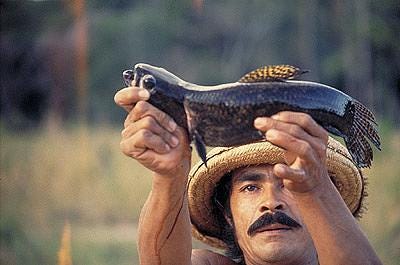
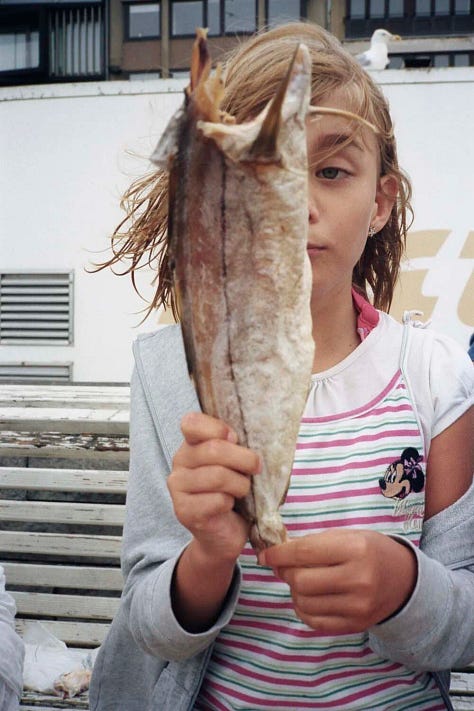
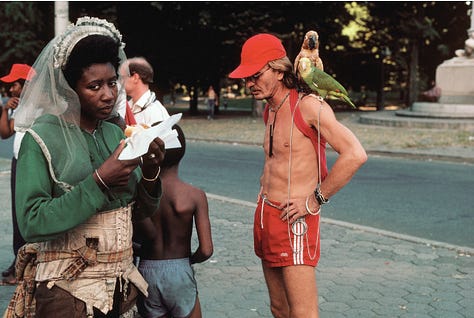

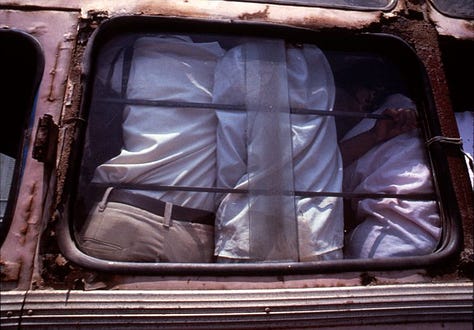
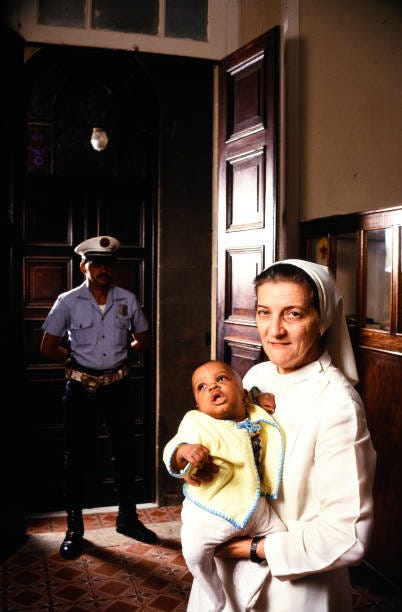
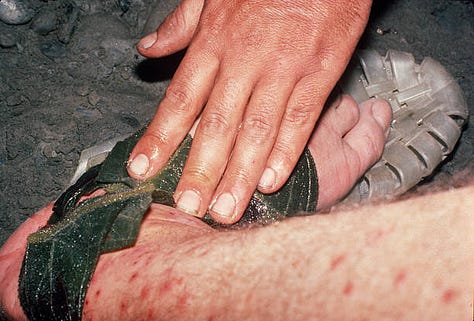

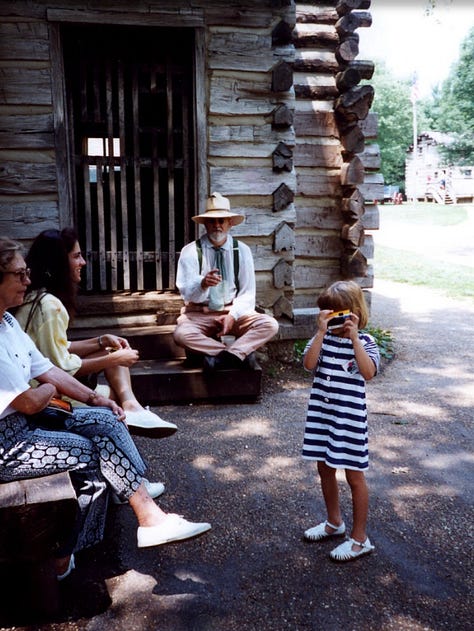
A Prayer
by Renata Mosci Sanfourche
How to tell the truth, the kind that incriminates the people I love. I have nothing without truth, and nothing without pity and compassion. I’m desperate to love anew, I can’t not love at all. Their faults are my truth. The frontiers we crossed, it’s ours, these ties, it’s my guilt. We soar like torpid ghosts. Wake me from this night, make me come to my truth and be brave to utter it now.
“I have no message, some things simply occur to me and I write them down with no aim to hurt anyone or to convert anyone. This is all I can say. I make this public confession of my poverty before everybody. Besides, had I not done so, you would have known it was true.”
— Jorge Luis Borges
Currently at Rue de Chabrol
Five articles I read this week:
In an article for the New York Review of Books, Adam Shatz reviews Anouar Brahem new album After the Last Sky (above). The composer describes it as a “cry of anguish for the people of Gaza”. It’s beautiful. I can’t stop listening to it. The title comes from a verse by the Palestinian poet Mahmoud Darwish, where he asks “Where should the birds fly, after the last sky?”
The Paris Review told me it was Flannery O’Connor’s 100th birthday this week and I decided to read this celebratory article by Jamie Quatro, who I had never heard of before (I’m living under a rock). This led me to one of her short stories called Yogurt Days. I’m hooked, I ordered Two-Step Devil.
I have not moved on from last week’s news about Columbia University. This essay in The Nation was written by Grant Miner, another expelled student. Also if you haven’t seen the Tufts video yet, I think you have to.
Savannah Walsh’s feature on Elizabeth Tabish for Vanity Fair had me asking a very genuine question: who has been watching this show and how come this is the first time I hear about it? For those of you who’ve never heard of The Chosen, like me, it has 280 million international viewers… to give you a sense of how huge that is, the season finale of Game of Thrones averaged 44 million viewers. What is going on? I really am living under a rock.
The Believer published a new poem by Ocean Vuong. What Vuong said on Insta about it: “wrote a long poem about the strange yet capacious condition of being 16 years old that—inevitably—devolves into the equally strange condition of being the 16th president.”
What my husband is listening to:
What my daughter is into: children’s magazines. We don’t have a subscription but when we’re at the airport or we walk by a newsstand we’ve gotten in the habit of buying her one and it usually helps us get through the flight. Now, every night when we put her to bed she bypasses reading an actual book for one of her French zines Les Belles Histoires.
A movie I’m thinking about:
Aquarius by Kleber Mendonça Filho
A Poem
Le vierge, le vivace et le bel aujourd'hui
by Stephane Mallarmé
Le vierge, le vivace et le bel aujourd'hui
Va-t-il nous déchirer avec un coup d'aile ivre
Ce lac dur oublié que hante sous le givre
Le transparent glacier des vols qui n'ont pas fui !
Un cygne d'autrefois se souvient que c'est lui
Magnifique mais qui sans espoir se délivre
Pour n'avoir pas chanté la région où vivre
Quand du stérile hiver a resplendi l'ennui.
Tout son col secouera cette blanche agonie
Par l'espace infligée à l'oiseau qui le nie,
Mais non l'horreur du sol où le plumage est pris.
Fantôme qu'à ce lieu son pur éclat assigne,
Il s'immobilise au songe froid de mépris
Que vêt parmi l'exil inutile le Cygne.




